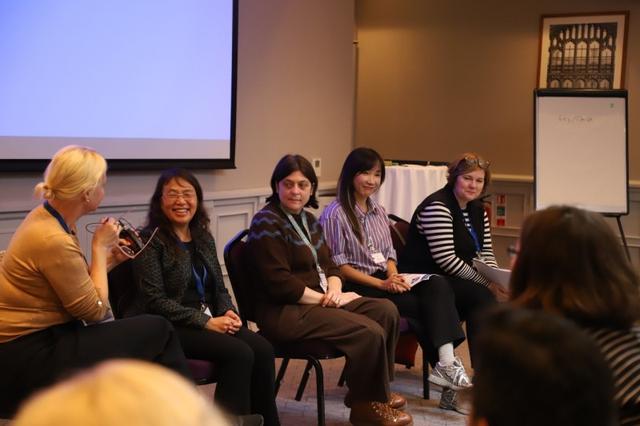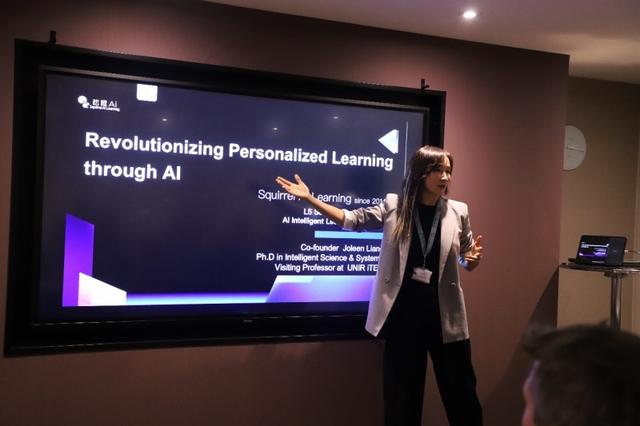Recently, the Cambridge 2024 Generative Artificial Intelligence Education Conference was successfully held in Cambridge, UK. This conference is jointly organized by the School of Education of the University of Cambridge, the School of Future Education of Beijing Normal University, the Digital Education Future Program of Hughes College of the University of Cambridge, and the Glenlead Center in London. Dr. Liang Jing, co-founder of Squirrel AI Learning, participated in this conference as a keynote speaker.
With the theme of "Human-computer collaboration expands dialogue space", the conference discussed how AI technology can promote educational innovation, improve teaching quality, student engagement, and redefine the role of educators. Education experts, researchers and policymakers from around the world gathered to conduct in-depth discussions on the potential and challenges of AI in education.

01 There are joys and worries about artificial intelligence empowering education
At the symposium titled "The Role of AI in Education: Friend or Foe", Dr. Ann Kristin Glenster from the University of Cambridge, Jenny Gibson, Professor of Neurodiversity and Developmental Psychology at the University of Cambridge, and Professor Yuan Li from Beijing Normal University , Kellie Mote, co-chair of the JISC Accessible Digital Future Project, and Dr. Liang Jing, co-founder of Squirrel AI, discussed their views on the application prospects of AI in the education field.
Dr. Liang Jing of Squirrel AI believes that for future artificial intelligence education, we need to focus on education itself, not just AI technology. Many companies and researchers focus too much on AI technology and ignore the needs of education itself.
In K12 education, students need to solve problems through the thinking and learning process, not just obtain direct answers. Squirrel AI's intelligent adaptive system was born based on this concept. Based on more than 10 billion student learning behavior records, the intelligent adaptive system can analyze students' strengths and weaknesses and provide them with personalized learning suggestions instead of giving direct answers. This can better promote students' thinking development instead of simply making them dependent on AI.
Regarding the relationship between AI and teachers, Liang Jing believes that AI will not completely replace teachers, but will replace some of their functions, such as knowledge transfer and ability training. The role of teachers will shift more to supervisors, data analysts, psychologists and other roles. In Squirrel AI's intelligent adaptive learning system, teachers are no longer responsible for teaching content, but interact with students and encourage them to learn.

Professor Yuan Li of Beijing Normal University believes that how to use AI technology to support educational innovation is very important for cultivating future teachers. Because technology like generative AI is so new, we still need a lot of research to understand it, especially in the field of teacher education. "It is very critical to improve teachers' ability to control AI, and they need to be helped to understand and use these technologies. In China, a lot of support has been given at the policy level, and many companies have integrated large models into the existing education system and applied them to classroom teaching . Therefore, our main concern is how these technologies affect teachers’ actual teaching operations,” said Professor Yuan Li.
Jenny Gibson, professor of neurodiversity and developmental psychology at the University of Cambridge, believes there is real potential for embedding generative AI in relevant vehicles and as a proficient teaching method. But she doesn't think teachers will be replaced anytime soon, as humans still need "old-fashioned" learning methods and learning in classrooms with real people is still essential.
Kellie Mote, co-chair of the JISC Accessible Digital Future Project, said that although AI has great potential, we cannot rely solely on it to solve all problems. She is very concerned about ensuring that AI technology is responsible, trustworthy, and integrated into learners’ lives.
02 Squirrel AI has the unshirkable responsibility to promote the progress of artificial intelligence education.
The Cambridge 2024 Generative Artificial Intelligence Education Conference focused on the integration of generative AI technology in education and its profound impact on academic practice, teaching design and evaluation. Many experts also gave keynote speeches.
Professor Wayne Holmes from University College London took the title "Artificial Intelligence and Education: Critical Research Perspectives" to deeply explore the role of AI technology in education, reveal the misunderstandings and ethical challenges of generative AI, and discuss how to balance when applying AI technology. Its relationship with educational equity and human rights.
Professor Rupert Wegerif from the School of Education at the University of Cambridge gave a speech "Generative AI and Expanded Dialogue Space" that explored how generative AI can expand dialogue space and promote students to think and communicate better. He advocated that the ultimate goal of using AI technology to support education should be to cultivate dialogue abilities so that students can benefit from multidisciplinary and global dialogues.
Dr. Liang Jing from Squirrel AI Learning delivered a speech entitled "Reshaping Personalized Education through AI", introducing Squirrel AI's research results and thoughts on artificial intelligence and personalized education to overseas educators.

In order to promote the application of artificial intelligence in education, Squirrel AI has invested more than 2 billion in technology research and development costs since its establishment. At the same time, combined with the accumulated learning behaviors of more than 10 billion students over the years, it has trained and created a multi-modal intelligent adaptive education large model LAM (Large Adaptive Model), which is also the world's first large vertical field model that combines intelligent adaptive technology with multi-modal large models and applies it to the field of education.
Relying on self-developed artificial intelligence adaptive learning and teaching technology, Squirrel AI has gradually entered the intelligent hardware track. Including Ai foundation, intelligent diagnosis, detailed breakdown of knowledge points, process-based learning, MCM learning ideas, abilities, method ability value training, error cause analysis, forgetting review, error book, report feedback, L5 level (autonomous driving) The human-computer interactive AI teaching function is highly recognized by parents and school teachers.
At the same time, through the deployment of efficient and large-scale offline store systems, it provides solid commercial support for the rapid popularization of Squirrel AI multi-modal intelligent adaptive education. As of now, Squirrel AI has more than 2,000 offline intelligent learning machines across the country. With its store business layout, it has become the largest AI learning machine brand in retail stores in the country. In the future, Squirrel AI will continue to work hard to provide the best AI intelligent teachers for every child.
Dr. Liang Jing also said that Squirrel AI has established a committee called the "AI Education Large Model Standards Committee", hoping to formulate standards for AI education. In the long term, humans need to trust these technologies, but some parameters and norms must be set. This means that from a technical and knowledge perspective, we need to comprehensively consider all aspects of education to ensure the effectiveness and safety of AI systems.
In the future, in order to continue to implement high-quality personalized education development, Squirrel AI will continue to carry out research and development of multi-modal intelligent adaptive education large model LAM, maintain industry-leading scientific and technological creativity, continue to inject new vitality into the education field, and promote education The comprehensive innovation of models, teaching methods and learning resources has fully opened the door to future education for students.